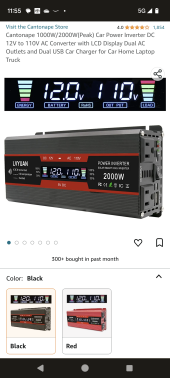French_guy
New Member
Hello
What would be a "decent" inverter in the 2,000W range? Not sure if I need modified or pure sine wave though
When I say decent, I mean a good compromise between price and quality/functionality
I don't want/need the top of the line that will cost an arm and a leg, but don't want either a cheap piece of junk
Thanks
What would be a "decent" inverter in the 2,000W range? Not sure if I need modified or pure sine wave though
When I say decent, I mean a good compromise between price and quality/functionality
I don't want/need the top of the line that will cost an arm and a leg, but don't want either a cheap piece of junk
Thanks



